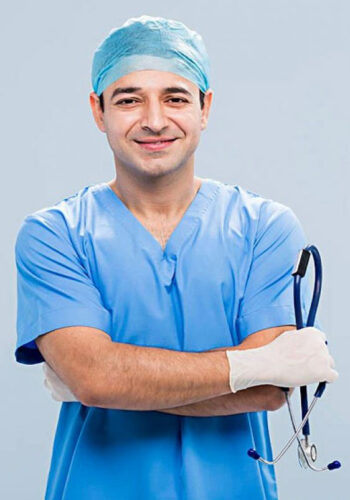MBBS
MBBS or Bachelor of Medicine and a Bachelor of Surgery also described as MBBS, an abbreviation of a Latin word which is Medicine Baccalaureus Chirurgical. This is a Bachelor of Medicine and Surgery degree program. The first two advanced and professional undergraduate medical degrees are Bachelor of Medicine and Bachelor of Surgery. It is probably one of the topmost degrees in the world and therefore by profession, after completing MBBS, an individual is officially transformed into a medical professional. This is a very prolonged study that requires a huge amount of patience and ability. Being a medical professional is one of the bravest and humble occupations. The curriculum describes different medicine and human anatomy is able to educate the participants on how to test and cure specific diseases. The course also covers numerous medical specialties to allow the learners to develop an in-depth understanding of the area of interest.
What are the benefit of doing MBBS?
- You’ll study the human body – inside and out.
- You’ll have perfect job security, even during the post-apocalypse.
- You can study Medicine anywhere in the world
- You’ll be a scientist
- You’ll have the latest technology at your fingertips.
Eligibility for MBBS

Applicants must meet the eligibility requirements for a Bachelor of Medicine and Bachelor of Surgery (BMBS) or MBBS degree. Candidates also should be aware of the basic requirements needed for pursuing a bachelor’s degree in medicine and a bachelor’s degree in surgery, including the course understanding. These are the necessary eligibility requirements that the students must follow to obtain MBBS admission:
- The minimum marks criteria may differ, although, in the intermediate test, general applicants should have scored at least 50 per cent marks.
- The minimum age requirement is 17 years to register for the MBBS programed.
- Applicants will have to pass the entrance examination needed for admissions.
- Applicants should have done at least 10 + 2 with mandatory subjects Physics, Chemistry and Biology.
- The minimum percentage for eligible candidates to the reserved category is 40 per cent.
- The maximum age restriction for applying for MBBS program is 25 years.
Careers Opportunities after MBBS
Medical Officers: Medical officers are also regarded as chief medical officers are doctors who are mainly in charge of clinics. Such physicians strongly recommend as well as provide medical assistance, problem detecting, and instruct on medical conditions and illness control. Medical officers play an important role in supervising patient treatment and the duties of other medical professionals. When services are initially implemented, they can sometimes actively participate in the treatment. They may very well assist in assessing and diagnosing family and individual’s necessities and plans of treatment.
Medical Surgeon: The surgeon is liable for the patient’s essential diagnosis, conducting the surgery and providing continuous medical care and treatment for the patient. The surgeon is often regarded as the surgical team leader. Medical surgeons work to make sure collaboration and coordination among all the other leaders of the surgical team, usually requiring another surgeon or an assistant to the surgeon, anesthesiologist, and nursing staff in the operating theatre. Patients are operated by them to enhance or recover health, like repairing injury problems or preventing depression. They follow surgical procedures formed mostly during operating conditions.

General Physician: With an MBBS degree graduates can begin their careers as a general physician who researches, diagnoses and treats and cures patient diseases. A physician typically treats diseases in the early stage, but if the illness remains serious after identification, then perhaps the patient is referred to a specialized medical professional. General Physicians are professionally educated physicians who provide elderly patients with a variety of nonsurgical medical attention. They treat complicated, critical or severe health issues, and they proceed to serve the patient unless they have treated or healed such complications.
Physicians: Physicians work in many different forms to treat patients, from chronic disease diagnosis to recommendations on healthcare services. Whilst also physician’s areas of expertise can sometimes differ significantly, the similarity along all specializations would be that physicians work primarily to identify and manage illnesses and injuries. Sometimes individuals do this by conducting screening tests, taking medical records, conducting and analyzing diagnostic procedures and suggesting a course of treatment. Physicians require a different level of intelligence and education, generally including a bachelor’s degree, a medical school degree, and practice for a prolonged period of time.
Pediatrician: A medical practitioner is in charge of treating kids with the disease and diagnoses their overall development and growth. In order to test and monitor the health and regular physical performance, pediatricians perform regular detailed tests on babies and young children and observe children evaluate their health and inquire questions to collect knowledge regarding complications. They prescribe medicine and provide specific guidance about how to take it.
Dietician: Dieticians encourage wellness in patients or the public at large and develop a balanced nutrition plan for them. Dietitians focus on providing knowledge on nutrition and health and therefore helping people to stay healthy. Individuals give advice and recommendations relating to nutrition. Dietitians may also modify diet plans to help maintain conditions like allergies and intolerances to food. They educate individuals and organizations on fundamental principles of healthy nutrition, appropriate food choices, and controlling nutrition to enhance their quality of life. They track activities of the food service to ensure alignment with nutritional, health, sanitation and safety standards.

